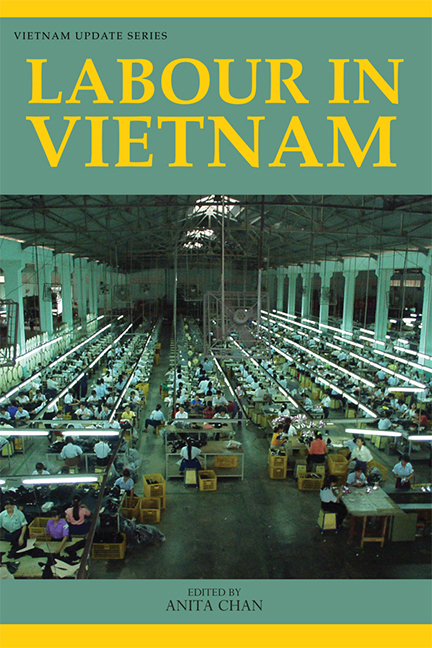Book contents
- Frontmatter
- Contents
- List of Tables and Figures
- Abbreviations
- Acknowledgements
- The Contributors
- 1 Introduction
- 2 “Awakening the Conscience of the Masses”: The Vietnamese Confederation of Labour 1947–75
- 3 State Enterprise Workers: “Masters” or “Commodities”?
- 4 The Redivision of Labour in a Red River Delta Village in a Globalized Economy
- 5 Corporate Social Responsibility in Socialist Vietnam: Implementation, Challenges, and Local Solutions
- 6 Workers' Protests in Contemporary Vietnam
- 7 Strikes in Vietnam and China in Taiwanese-owned Factories: Diverging Industrial Relations Patterns
- 8 The Dynamics of a Multinational Factory Regime and Recent Strikes in Vietnam
- 9 How Does Enterprise Ownership Matter? Labour Conditions in Fashion and Footwear Factories in Southern Vietnam
- 10 Exploitative Recruitment Processes and Working Conditions of Vietnamese Migrant Workers in Taiwan
- Index
10 - Exploitative Recruitment Processes and Working Conditions of Vietnamese Migrant Workers in Taiwan
Published online by Cambridge University Press: 21 October 2015
- Frontmatter
- Contents
- List of Tables and Figures
- Abbreviations
- Acknowledgements
- The Contributors
- 1 Introduction
- 2 “Awakening the Conscience of the Masses”: The Vietnamese Confederation of Labour 1947–75
- 3 State Enterprise Workers: “Masters” or “Commodities”?
- 4 The Redivision of Labour in a Red River Delta Village in a Globalized Economy
- 5 Corporate Social Responsibility in Socialist Vietnam: Implementation, Challenges, and Local Solutions
- 6 Workers' Protests in Contemporary Vietnam
- 7 Strikes in Vietnam and China in Taiwanese-owned Factories: Diverging Industrial Relations Patterns
- 8 The Dynamics of a Multinational Factory Regime and Recent Strikes in Vietnam
- 9 How Does Enterprise Ownership Matter? Labour Conditions in Fashion and Footwear Factories in Southern Vietnam
- 10 Exploitative Recruitment Processes and Working Conditions of Vietnamese Migrant Workers in Taiwan
- Index
Summary
In the past two decades, the rapidly industrializing Asian region has witnessed highly mobile intraregional labour flows. A key feature of this phenomenon is the critical role that intermediary actors play at all stages of the labour migration process. Governments sign bilateral agreements on the export and import of low-skilled and unskilled labour and delegate the job of organizing the migration of workers to recruitment and placement actors. This profit-making system that recruits, trains, transports, and places workers in distant foreign workplaces is often referred to as the migration industry. Highlighting the centrality of intermediaries in labour migration, John Salt and Jeremy Stein (1997) describes the industry as “migration as a business”.
Since the early 1990s, this migration industry has seen unprecedented growth due to the rapid increase in contract migrant labourers moving between the economically developing and developed countries of Asia (Hugo 2004; Skeldon 2000). Japan and the so-called “tiger economies” of East Asia — Taiwan, South Korea, Hong Kong, and Singapore — have opened their doors to increasing numbers of temporary migrant workers from the Philippines, Indonesia, Thailand, Vietnam, Bangladesh, and China. Despite their centrality and importance in Asian labour migration, those involved in the migration industry have been little studied, partly due to the difficulty of separating legal from illegal activities and the obstacles associated with a thorough investigation of such activities (Hugo 2004). Nonetheless, intermediary actors and their relationships with states and workers are an extremely important influence on migrant lives, working conditions, and income; any serious attempt to understand migration needs to pay attention to the role of these actors and the relationships among them.
In this chapter, we document and discuss the complexities of international labour export and import using the Vietnam–Taiwan dyad as a case study: Vietnam being the sending country, and Taiwan, the recipient. This system is complex, involving placement and recruitment intermediaries, state officials, and workers who rarely have a full understanding of the entire system in which they are all embedded and participate in.
- Type
- Chapter
- Information
- Labour in Vietnam , pp. 309 - 334Publisher: ISEAS–Yusof Ishak InstitutePrint publication year: 2011



